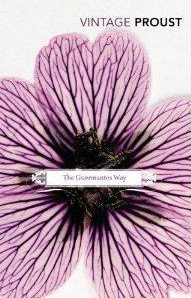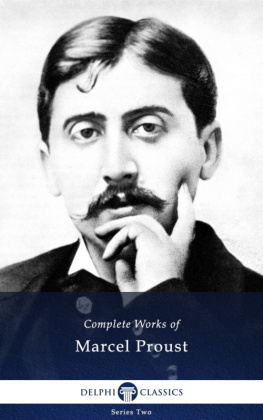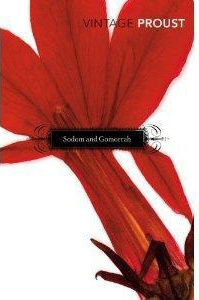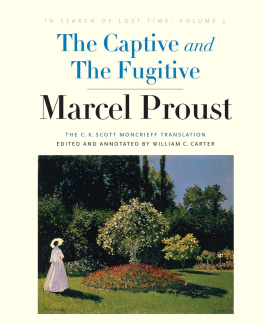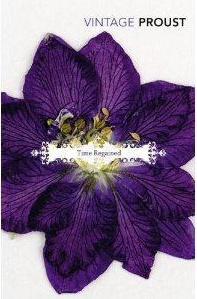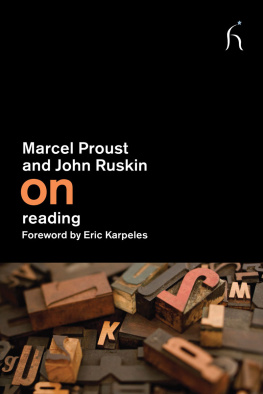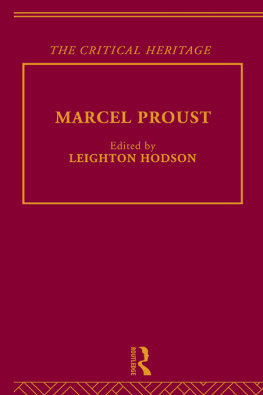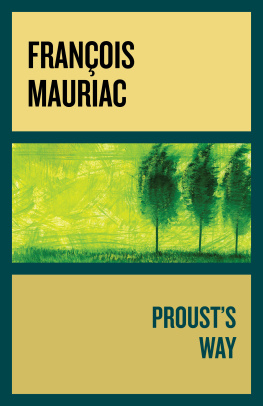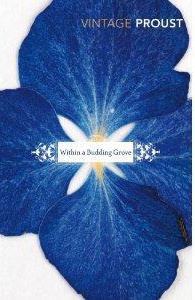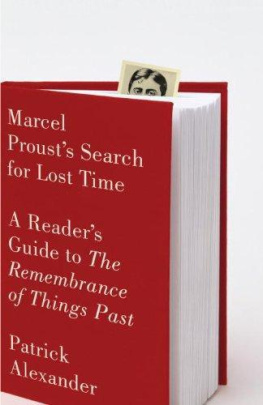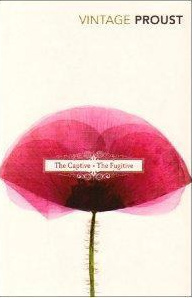Marcel Proust - Remembrance of Things Past, Vol. 3: The Captive, The Fugitive & Time Regained
Here you can read online Marcel Proust - Remembrance of Things Past, Vol. 3: The Captive, The Fugitive & Time Regained full text of the book (entire story) in english for free. Download pdf and epub, get meaning, cover and reviews about this ebook. year: 1982, publisher: Vintage, genre: Detective and thriller. Description of the work, (preface) as well as reviews are available. Best literature library LitArk.com created for fans of good reading and offers a wide selection of genres:
Romance novel
Science fiction
Adventure
Detective
Science
History
Home and family
Prose
Art
Politics
Computer
Non-fiction
Religion
Business
Children
Humor
Choose a favorite category and find really read worthwhile books. Enjoy immersion in the world of imagination, feel the emotions of the characters or learn something new for yourself, make an fascinating discovery.
- Book:Remembrance of Things Past, Vol. 3: The Captive, The Fugitive & Time Regained
- Author:
- Publisher:Vintage
- Genre:
- Year:1982
- Rating:5 / 5
- Favourites:Add to favourites
- Your mark:
- 100
- 1
- 2
- 3
- 4
- 5
Remembrance of Things Past, Vol. 3: The Captive, The Fugitive & Time Regained: summary, description and annotation
We offer to read an annotation, description, summary or preface (depends on what the author of the book "Remembrance of Things Past, Vol. 3: The Captive, The Fugitive & Time Regained" wrote himself). If you haven't found the necessary information about the book — write in the comments, we will try to find it.
Remembrance of Things Past, Vol. 3: The Captive, The Fugitive & Time Regained — read online for free the complete book (whole text) full work
Below is the text of the book, divided by pages. System saving the place of the last page read, allows you to conveniently read the book "Remembrance of Things Past, Vol. 3: The Captive, The Fugitive & Time Regained" online for free, without having to search again every time where you left off. Put a bookmark, and you can go to the page where you finished reading at any time.
Font size:
Interval:
Bookmark:
The Guermantes Way
by
Marcel Proust
Vol. 3 of Remembrance of Things Past
( la Recherche du temps perdu)
Translated from the French by
C. K. Scott Moncrieff
Table of Contents
AUTHOR'S DEDICATION
A
LEON DAUDET
A l'auteur
du VOYAGE DE SHAKESPEARE,
du PARTAGE DE L ENFANT,
de L' ASTRE NOIR,
de FANTOMES ET VIVANTS,
du MONDE DES IMAGES,
de tant de chefs-d'oeuvre,
A l'incomparable ami
en temoignage
de reconnaissance et d'admiration
M. P.
TRANSLATOR'S DEDICATION
To
MRS. H-,
on her Birthday
OBERON, in the ATHENIAN glade,
Reduced by deft TITANIA'S power,
Invented arts for NATURE'S aid
And from a snowflake shaped a flower:
NATURE, to outdo him, wrought of human clay
A fairy blossom, which we acclaim to-day.
HEBE, to high OLYMPUS borne,
Undoomed to death, by age uncurst,
XERES and PORTO, night and morn,
Let flow, to appease celestial thirst:
Ev'n so, untouched by years that envious pass
YOUTH greets the guests to-night and fills the glass.
HESIONE, for monstrous feast,
Against a rock was chained, to die;
Young HERCLES came, he slew the beast,
Nor won the award of chivalry:
E. S. P. H., whom monsters hold in awe,
Shield thee from injury, and enforce the law!
C. K. S. M.
PART I
CHAPTER ONE
THE DUCHESSE DE GUERMANTES
THE twittering of the birds at daybreak sounded insipid to Franoise. Every word uttered by the maids upstairs made her jump; disturbed by all their running about, she kept asking herself what they could be doing. In other words, we had moved. Certainly the servants had made no less noise in the attics of our old home; but she knew them, she had made of their comings and goings familiar events. Now she faced even silence with a strained attention. And as our new neighbourhood appeared to be as quiet as the boulevard on to which we had hitherto looked had been noisy, the song (distinct at a distance, when it was still quite faint, like an orchestral motif ) of a passer-by brought tears to the eyes of a Franoise in exile. And so if I had been tempted to laugh at her in her misery at having to leave a house in which she was 'so well respected on all sides' and had packed her trunks with tears, according to the Use of Combray, declaring superior to all possible houses that which had been ours, on the other hand I, who found it as hard to assimilate new as I found it easy to abandon old conditions, I felt myself drawn towards our old servant when I saw that this installation of herself in a building where she had not received from the hall-porter, who did not yet know us, the marks of respect necessary to her moral well being, had brought her positively to the verge of dissolution. She alone could understand what I was feeling; certainly her young footman was not the person to do so; for him, who was as unlike the Combray type as it was possible to conceive, packing up, moving, living in another district, were all like taking a holiday in which the novelty of one's surroundings gave one the same sense of refreshment as if one had actually travelled; he thought he was in the country; and a cold in the head afforded him, as though he had been sitting in a draughty railway carriage, the delicious sensation of having seen the world; at each fresh sneeze he rejoiced that he had found so smart a place, having always longed to be with people who travelled a lot. And so, without giving him a thought, I went straight to Franoise, who, in return for my having laughed at her tears over a removal which had left me cold, now shewed an icy indifference to my sorrow, but because she shared it. The 'sensibility' claimed by neurotic people is matched by their egotism; they cannot abide the flaunting by others of the sufferings to which they pay an ever increas-ing attention in themselves. Franoise, who would not allow the least of her own ailments to pass unnoticed, if I were in pain would turn her head from me so that I should not have the satisfaction of seeing my sufferings pitied, or so much as observed. It was the same as soon as I tried to speak to her about our new house. Moreover, having been obliged, a day or two later, to return to the house we had just left, to retrieve some clothes which had been overlooked in our removal, while I, as a result of it, had still a 'temperature,' and like a boa constrictor that has just swallowed an ox felt myself painfully distended by the sight of a long trunk which my eyes had still to digest, Franoise, with true feminine inconstancy, came back saying that she had really thought she would stifle on our old boulevard, it was so stuffy, that she had found it quite a day's journey to get there, that never had she seen such stairs, that she would not go back to live there for a king's ransom, not if you were to offer her millions-a pure hypothesis-and that everything (everything, that is to say, to do wit h the kitchen and 'usual offices') was much better fitted up in the new house. Which, it is high time now that the reader should be told-and told also that we had moved into it because my grandmother, not having been at all well (though we took care to keep this reason from her), was in need of better air-was a flat forming part of the Hotel de Guermantes.
At the age when a Name, offering us an image of the unknowable which we have poured into its mould, while at the same moment it connotes for us also an existing place, forces us accordingly to identify one with the other to such a point that we set out to seek in a city for a soul which it cannot embody but which we have no longer the power to expel from the sound of its name, it is not only to towns and rivers that names give an individuality, as do allegorical paintings, it is not only the physical universe which they pattern with differences, people with marvels, there is the social universe also; and so every historic house, in town or country, has its lady or its fairy, as every forest has its spirit, as there is a nymph for every stream. Sometimes, hidden in the heart of its name, the fairy is transformed to suit the life of our imagination by which she lives; thus it was that the atmosphere in which Mme. de Guermantes existed in me, after having been for years no more than the shadow cast by a magic lantern slide or the light falling through a painted window, began to let its colour fade when quite other dreams impregnated it with the bubbling coolness of her flowing streams.
And yet the fairy must perish if we come in contact with the real person to whom her name corresponds, for that person the name then begins to reflect, and she has in her nothing of the fairy; the fairy may revive if were move ourself from the person, but if we remain in her presence the fairy definitely dies and with her the name, as happened to the family of Lusignan, which was fated to become extinct on the day when the fairy Melusine should disappear. Then the Name, beneath our successive 'restorations' of which we may end by finding, as their original, the beautiful portrait of a strange lady whom we are never to meet, is nothing more than the mere photograph, for identification, to which we refer in order to decide whether we know, whether or not we ought to bow to a person who passes us in the street. But let a sensation from a bygone year-like those recording instruments which preserve the sound and the manner of the various artists who have sung or played into them-enable our memory to make us hear that name with the particular ring with which it then sounded in our ears, then, while the name itself has apparently not changed, we feel the distance that separates the dreams which at different times its same syllables have meant to us. For a moment, from the clear echo of its warbling in some distant spring, we can extract, as from the little tubes: which we use in painting, the exact, forgotten, mysterious, fresh tint of the days which we had believed ourself to be recalling, then, like a bad painter, we were giving to the whole of our past, spread out on the same anvas, the tones, conventional and all alike, of our unprompted memory. Whereas on the contrary, each of the moments that composed it employed, for an original creation, in a matchless harmony, the colour of those days which we no longer know, and which, for that matter, will still suddenly enrapture me if by any chance the name 'Guermantes,' resuming for a moment, after all these years, the sound, so different from its sound today, which it had for me on the day of Mlle. Percepied's marriage, brings back to me that mauve-so delicate, almost too bright, too new-with which the billowy scarf of the young Duchess glowed, and, like two periwinkleflowers, growing beyond reach and blossoming now again, her two eyes, sunlit with an azure smile. And the name Guermantes of those days is also like one of those little balloons which have been filled with oxygen, or some such gas; when I come to explode it, to make it emit what it contains, I breathe the air of the Combray of that year, of that day, mingled with a fragrance of hawthorn blossom blown by the wind from the corner of the square, harbinger of rain, which now sent the sun packing, now let him spread himself over the red woollen carpet to the sacristy, steeping it in a bright geranium scarlet, with that, so to speak, Wagnerian harmony in its gaiety which makes the wedding service always impressive. But even apart from rare moments such as these, in which suddenly we feel the original entity quiver and resume its form, carve itself out of the syllables now soundless, dead; if, in the giddy rush of daily life, in which they serve only the most practical purposes, names have lost all their colour, like a prismatic top that spins too quickly and seems only grey, when, on the other hand, in our musings we reflect, we seek, so as to return to the past, to slacken, to suspend the perpetual motion by which we are borne along, gradually we see once more appear, side by side, but entirely distinct from one another, the tints which in the course of our existence have been successively presented to us by a single name.
Font size:
Interval:
Bookmark:
Similar books «Remembrance of Things Past, Vol. 3: The Captive, The Fugitive & Time Regained»
Look at similar books to Remembrance of Things Past, Vol. 3: The Captive, The Fugitive & Time Regained. We have selected literature similar in name and meaning in the hope of providing readers with more options to find new, interesting, not yet read works.
Discussion, reviews of the book Remembrance of Things Past, Vol. 3: The Captive, The Fugitive & Time Regained and just readers' own opinions. Leave your comments, write what you think about the work, its meaning or the main characters. Specify what exactly you liked and what you didn't like, and why you think so.

